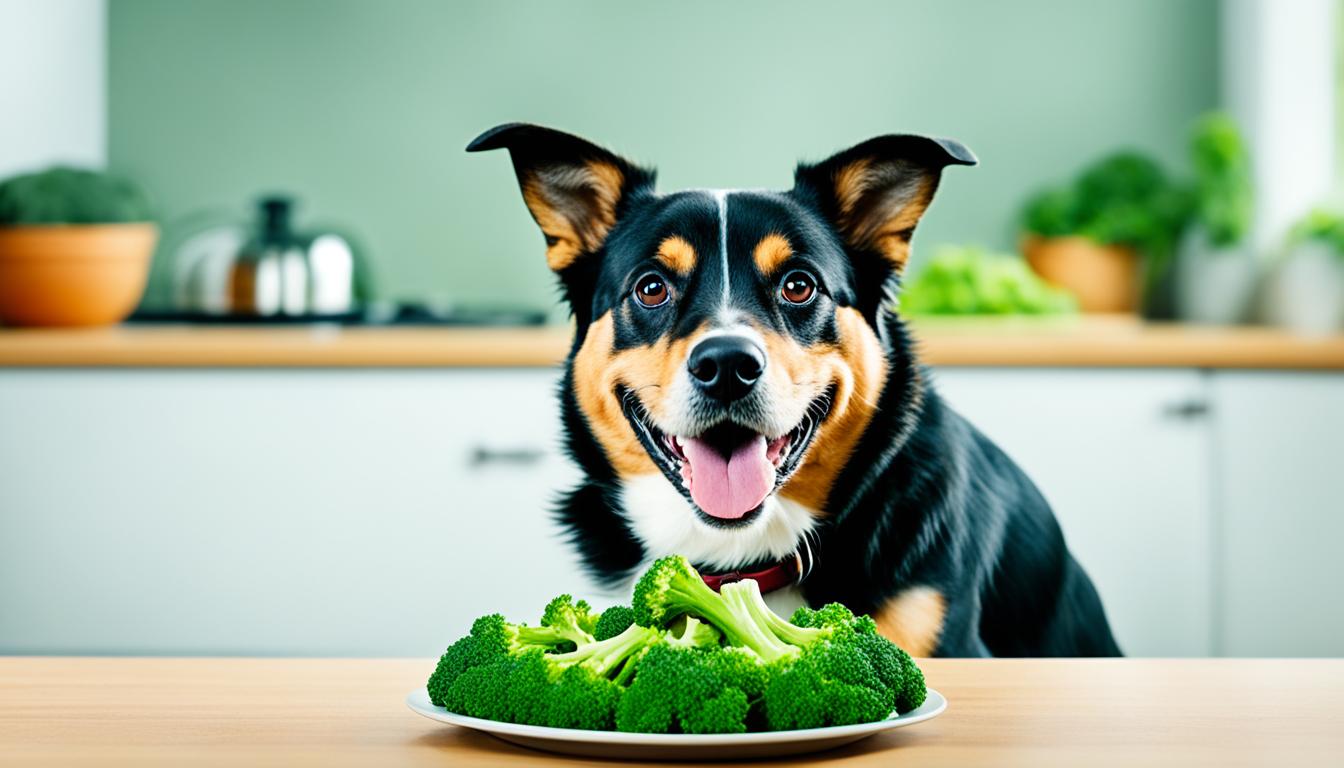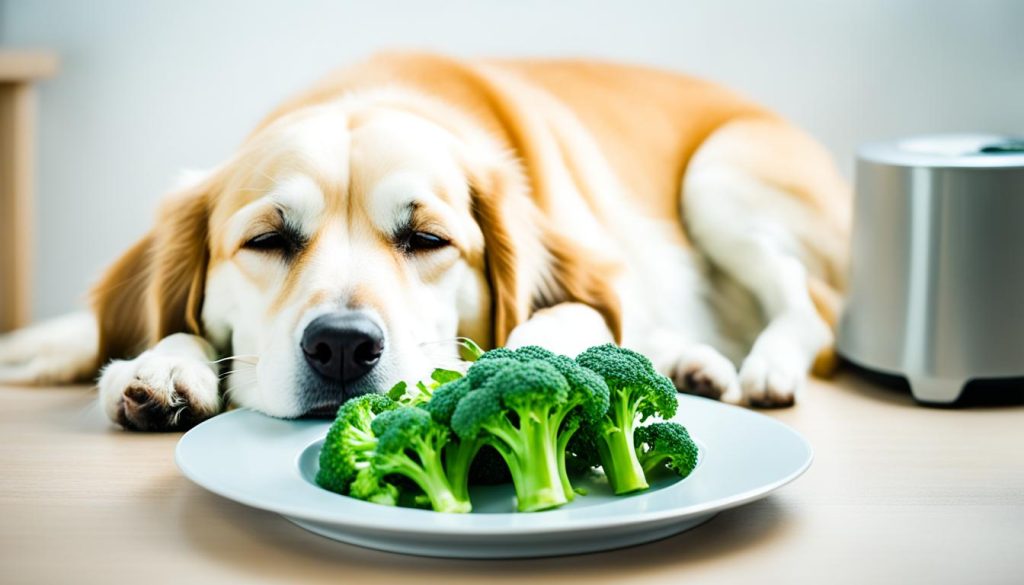Can Dogs Eat Broccoli? A Guide to Feeding This Veggie
Uncover the truth about feeding your dog broccoli. Get the latest advice on safe portions and how to avoid risks with this helpful guide.

Did you know that broccoli, the beloved vegetable that graces our dinner plates, can also be a nutritious addition to your dog’s diet? Yes, that’s right! While some human foods are off-limits for our canine friends, broccoli is actually safe for dogs to eat in moderation. In this comprehensive guide, we will explore the safety, health benefits, and potential risks of feeding broccoli to dogs. We will also address concerns regarding serving size, preparation methods, and alternative vegetables that are safe for dogs. So, if you’ve ever wondered can dogs eat broccoli, this blog has got you covered!
Exploring the Safety of Broccoli for Canine Consumption

When it comes to feeding broccoli to dogs, it’s essential to understand the safety considerations. Identifying what makes broccoli a possible dog treat, gauging the ideal serving size for your furry friend, and knowing whether dogs can eat raw broccoli are important factors to consider.
Broccoli can be considered a potential dog treat due to its numerous health benefits. Not only is broccoli low in fat, but it is also rich in fiber and vitamin C, making it a nutritious addition to your canine companion’s diet. The fiber in broccoli aids in digestion, while vitamin C supports the immune system. When it comes to serving size, moderation is key to ensure the safety of your dog. While broccoli is a healthy vegetable, serving it in excessive amounts can lead to gastric irritation. It is crucial to feed your dog broccoli in appropriate portions that complement their overall diet. Consult with your veterinarian to determine the serving size suitable for your dog’s breed, size, and individual needs.
Health Benefits of Broccoli for Dogs
Broccoli offers numerous health benefits for dogs due to its high nutritional value. It is packed with essential nutrients that can contribute to their overall well-being. Incorporating broccoli into their diet can help support various aspects of their health, including digestion, immune system function, and antioxidant protection.
One of the primary health benefits of broccoli for dogs is its fiber content. Fiber aids in promoting proper digestion and can help regulate bowel movements, reducing the risk of constipation or diarrhea. Additionally, the high fiber content in broccoli can help dogs feel full, which may be beneficial for weight management and preventing overeating. Broccoli also contains significant amounts of vitamins, including vitamin C, vitamin K, and B vitamins. Vitamin C plays a crucial role in supporting the immune system, helping to protect dogs against illnesses and infections. Vitamin K is essential for blood clotting and bone health, while B vitamins contribute to overall energy production and nervous system function.
Furthermore, broccoli is a rich source of minerals such as calcium, potassium, and iron. Calcium is important for maintaining healthy bones and teeth, while potassium is essential for proper muscle function and maintaining electrolyte balance. Iron supports the production of red blood cells and helps prevent anemia in dogs. Another notable health benefit of broccoli for dogs is its antioxidant properties. Antioxidants help protect cells from damage caused by harmful free radicals, reducing the risk of chronic diseases and promoting overall cellular health. The presence of antioxidants in broccoli can contribute to a stronger immune system and improved overall well-being in dogs.
Real-life examples often highlight the positive impact of broccoli on canine health. Many dog owners have reported improvements in their dogs’ digestion, coat quality, and overall energy levels after incorporating broccoli into their diet. However, it is essential to consult with a veterinarian before making any dietary changes or introducing a new food to ensure it aligns with your dog’s specific needs and health conditions.
| Nutrient | Benefits |
|---|---|
| Fiber | Improved digestion, weight management |
| Vitamin C | Enhanced immune system function |
| Vitamin K | Healthy blood clotting, bone health |
| B Vitamins | Energy production, nervous system health |
| Calcium | Strong bones and teeth |
| Potassium | Proper muscle function, electrolyte balance |
| Iron | Red blood cell production, prevention of anemia |
| Antioxidants | Cellular protection, immune support |
Understanding Broccoli’s Nutritional Value
Broccoli is a nutrient-rich vegetable that offers numerous health benefits for dogs. It is important to understand the nutritional value of broccoli in order to make informed decisions about incorporating it into your dog’s diet.
Why Fiber Matters in a Dog’s Diet
Fiber plays a crucial role in a dog’s digestive health. It aids in bowel movements, promotes healthy gut bacteria, and prevents constipation. Including fiber in your dog’s diet can also help regulate blood sugar levels and promote a feeling of fullness, which can assist in weight management.
Broccoli is an excellent source of dietary fiber, making it a great addition to your dog’s meals. The fiber content in broccoli helps support a healthy digestive system and can contribute to overall well-being for your furry friend.
Vitamins and Minerals Found in Broccoli
Broccoli is packed with essential vitamins and minerals that can benefit your dog’s health. It is rich in vitamin C, which helps strengthen the immune system and aids in collagen production. Vitamin K, another nutrient found in broccoli, plays a crucial role in proper blood clotting.
In addition to vitamins, broccoli contains important minerals such as calcium, phosphorus, and potassium. These minerals are essential for maintaining healthy bones, teeth, and muscles in dogs. Including broccoli in your dog’s diet can help ensure they receive these vital nutrients.
The Role of Antioxidants and Folic Acid
Broccoli is a powerhouse of antioxidants, which help combat free radicals and reduce oxidative stress in your dog’s body. This can contribute to reducing the risk of chronic diseases and promoting overall cellular health.
Furthermore, broccoli contains folic acid, a B-vitamin that is crucial for cell growth and development. Folic acid is particularly important for pregnant dogs as it supports the healthy development of puppies.
| Nutrient | Amount per 100g of Broccoli |
|---|---|
| Fiber | 2.6g |
| Vitamin C | 89.2mg |
| Vitamin K | 101.6μg |
| Calcium | 47mg |
| Phosphorus | 66mg |
| Potassium | 316mg |
This table provides a snapshot of the nutritional value of 100 grams of broccoli. It showcases the fiber content, as well as the amounts of key vitamins and minerals found in broccoli, highlighting its nutritional benefits for dogs.
Integrating broccoli into your dog’s diet can provide them with valuable nutrients they need to thrive. However, it’s important to balance their diet and consult with a veterinarian before making any significant changes. Incorporating broccoli as part of a varied diet can contribute to your dog’s overall health and well-being.
Can Dogs Eat Broccoli?
When it comes to feeding your dog broccoli, it’s essential to understand the appropriate serving size. While broccoli offers numerous health benefits, overfeeding can lead to potential risks. This section will guide you on the appropriate amount of broccoli your dog can consume and shed light on the risks associated with excessive consumption.
Adhering to the 10 Percent Rule for Treats
Just like with any treat or food addition, it’s crucial to follow the 10 percent rule for treats in your dog’s diet. This means that treats, including broccoli, should only make up a small portion of your dog’s daily caloric intake.
To determine the appropriate serving size of broccoli, consider your dog’s size, age, weight, and overall health. As a general guideline, the appropriate serving size of broccoli for dogs is about 10 percent of their daily calorie intake.
The Toxicity of Isothiocyanates in Large Amounts
While broccoli is generally safe for dogs, it’s important to be aware of the toxicity of isothiocyanates. Isothiocyanates are natural compounds found in broccoli responsible for its distinct taste and aroma.
In large amounts, isothiocyanates can cause gastric irritation in dogs, leading to symptoms such as upset stomach, diarrhea, or vomiting. These symptoms may arise if dogs consume excessive amounts of broccoli or have a sensitive digestive system.
To ensure your dog’s safety, it’s crucial to moderate the amount of broccoli they consume and be mindful of any adverse reactions. If you notice any discomfort or digestive issues, consult your veterinarian for guidance. Remember, broccoli should be given to your dog in appropriate serving sizes and as part of a balanced diet. Providing a variety of vegetables and seeking guidance from your veterinarian will help ensure your dog’s nutritional needs are met.
Potential Risks When Feeding Dogs Broccoli
While broccoli can be a healthy addition to a dog’s diet, it’s important to be aware of the potential risks involved. Responsible feeding practices are crucial to ensure the well-being of your furry friend. In this section, we will discuss two primary concerns when feeding dogs broccoli: the choking hazard posed by broccoli stems and the risk of digestive issues that can arise from consuming too much broccoli.
Choking Hazard
Broccoli stems can present a choking hazard for dogs. These tough and fibrous parts of the vegetable can be difficult for dogs to chew and swallow. To minimize the risk, it is important to cut the broccoli stems into bite-sized chunks or consider removing them altogether. By doing so, you will ensure that your dog can safely enjoy the nutritional benefits of broccoli without endangering their well-being.
Digestive Issues
Feeding too much broccoli to dogs can lead to digestive issues such as upset stomach or diarrhea. Although broccoli is rich in fiber and can aid in digestion, an excessive intake can overwhelm a dog’s digestive system, causing discomfort and digestive upset. It is important to introduce broccoli to your dog’s diet gradually and in moderation. Observing your dog’s reaction and consulting with a veterinarian can help you determine the appropriate serving size for your furry friend.
By being mindful of these risks and taking the necessary precautions, you can safely incorporate broccoli into your dog’s diet and ensure their well-being. Next, we will provide guidelines for introducing broccoli to your dog’s diet and the appropriate ways to prepare it to maximize its nutritional benefits.
Guidelines for Introducing Broccoli to Your Dog’s Diet
Introducing new foods to your dog’s diet requires careful consideration to ensure a smooth transition. When it comes to introducing broccoli, a gradual approach is key to avoiding digestive upset and allowing your furry friend to adjust to this nutritious vegetable.
To begin introducing broccoli to your dog’s diet, start by offering small amounts as a supplement to their regular meals. You can chop the broccoli into small, bite-sized pieces to make it more manageable for your dog to eat. Mixing it in with their regular food will help them become accustomed to the taste and texture.
Monitor your dog’s reaction to the broccoli. Some dogs may take to it immediately, while others might need more time to adapt. Watch for any signs of digestive discomfort, such as loose stools or gas. If you notice any adverse reactions, consider reducing the amount of broccoli or consulting with a veterinarian.

When transitioning your dog to a new food, including broccoli, it’s important to remember that every dog is unique. Some dogs may have specific dietary requirements or medical conditions that need to be considered. Consulting with a veterinarian before making any major changes to your dog’s diet is always recommended.
As you gradually increase the amount of broccoli in your dog’s diet, it’s important to maintain balance and variety. Remember that broccoli should only be a part of a balanced diet and not the sole source of nutrition for your dog. Including other dog-friendly vegetables, such as carrots, green beans, or sweet potatoes, can offer additional nutrients and variety to their meals.
Appropriate Ways to Prepare Broccoli for Dogs
When it comes to preparing broccoli for your furry friend, it’s important to use methods that retain the vegetable’s nutritional value while ensuring that it is safe for canine consumption. Whether you prefer steaming, boiling, or serving it raw, there are several options for incorporating broccoli into your dog’s diet.
One popular method of preparing broccoli for dogs is steaming. Steaming helps to maintain the vegetable’s nutrients and natural flavors. To steam broccoli, simply place it in a steamer basket over boiling water and cook until tender. This cooking method preserves the vibrant color and crisp texture of the vegetable, making it appealing to both the eye and the palate.
Another cooking method to consider is boiling. Boiled broccoli can be a softer option for dogs with dental issues or older dogs who may have trouble chewing. To boil broccoli, bring a pot of water to a boil, add the broccoli florets, and cook until they are tender. Be sure to avoid overcooking, as this can result in a loss of nutrients.
If you prefer to serve raw broccoli to your dog, it is important to ensure that it is cut into bite-sized pieces that are easy for them to chew and digest. Raw broccoli can provide additional crunch and freshness to their meal. However, keep in mind that some dogs may have difficulty digesting raw vegetables, so it’s essential to monitor their response and make any necessary adjustments to their diet.

Alternatives: What Are the Best Vegetables for Dogs?
While broccoli is a nutritious and safe vegetable for dogs, it’s always good to offer variety in their diet. There are several other vegetables that are also safe and beneficial for your furry friend. These dog-friendly vegetables provide a range of essential nutrients to support their overall health and well-being.
A great alternative to broccoli is carrots. Carrots are low in calories and high in fiber, making them an excellent addition to your dog’s diet. They are also rich in vitamin A, which promotes healthy eyesight and a strong immune system. You can serve them raw or lightly steamed for a crunchy and delicious treat.
Another option is green beans. Green beans are packed with vitamins and minerals, including vitamin C and manganese. They are low in calories and high in fiber, making them a great choice for dogs that need to watch their weight. Steamed or boiled green beans can be served as a nutritious snack or mixed into their regular meals.
For a leafy green alternative, consider spinach. Spinach is loaded with iron, calcium, and vitamins A, C, and K. It provides antioxidants that can help boost your dog’s immune system and promote healthy digestion. Remember to steam or sauté spinach before serving to make it easier for your dog to digest.
FAQs on Can dogs eat broccoli
Is broccoli safe for dogs to eat?
Broccoli is generally safe for dogs to eat in moderation. However, large amounts of broccoli can cause gastric irritation, so it’s important to feed it in appropriate serving sizes.
What are the health benefits of broccoli for dogs?
Broccoli offers various health benefits for dogs, including improved digestion, immune support, and antioxidant properties due to its high fiber, vitamin, and mineral content.
What nutrients are found in broccoli that are beneficial for dogs?
Broccoli is rich in fiber, vitamins (such as vitamin C and K), minerals (including folic acid), and antioxidants, all of which contribute to a dog’s overall health and well-being.
How much broccoli can I give my dog?
It’s best to adhere to the 10 percent rule for treats in a dog’s diet. Moderation is key to avoid gastric irritation. Consult with your veterinarian for specific serving size recommendations based on your dog’s size and dietary needs.
Are there any risks associated with feeding dogs broccoli?
Feeding dogs large amounts of broccoli can pose a choking hazard, especially with the stems. It’s important to cut broccoli into bite-sized chunks. Additionally, overfeeding broccoli can lead to digestive issues like upset stomach or diarrhea.
What are the appropriate ways to prepare broccoli for dogs?
Broccoli can be served steamed, boiled, or raw. Avoid using harmful seasonings or oils when preparing it. Cut it into bite-sized portions to ensure it’s safe for your dog to consume.





